---------------------------------------------------------
Feeding your backyard duck flock can be challenging. While feed stores carry several kinds of chicken feed and a “mixed flock” feed, finding waterfowl feed can be harder. Way more people keep chickens than they do ducks, so chicken feed is generally much easier to find.
I had tried the mixed flock feed once before with my chickens and was pretty unhappy with it. It was marketed as being good for chickens, ducks, geese, & turkeys from babies to adults. Sounds like the perfect solution right? I didn’t think so, at least not that brand. When my layer chickens were on the mixed flock feed there was a noticeable drop in egg production, and it is the only time we ever have seen the strange “no shell eggs”.
This leads me to believe in an effort to provide nutrition for different age ranges and species it is shortchanging birds in some areas. Maybe it was just a bad brand, in either case, it made me leary of trying again. When we added ducks to our flock, I knew I didn’t want to go back to the mixed flock feed. But in the absence of waterfowl feed, what should we do? To save space and effort is it ok to just feed your ducks chicken feed?
Early Duckling Stage (0-2 weeks)
If you can find waterfowl starter feed this is the best option. If you can’t find that, the second best would be to feed your ducklings chick starter crumbles. Ducklings grow much faster than chicks. To facilitate this fast growth, you want to be sure you are providing your ducklings with enough protein. Try to find a high protein chick starter (20-22% would be ideal) for those first two weeks if possible. At the very least, get one with 18% protein.
Because ducklings eat so much more than chicks, you want to feed non medicated chick starter. Ducklings will eat too much and can over-medicate themselves. Chick feed is medicated to prevent coccidiosis, which is common among chickens, but pretty rare in ducks so the medication is unnecessary anyway.
The other consideration with feeding ducklings chick starter is the niacin levels. Ducklings require 2-3 times the amount of niacin that chicks need, deficiencies can lead to bowed legs, leg weakness, and joint issues. An easy source of niacin is powdered brewer’s yeast. Add 1.5 tablespoons of brewers yeast to every cup of chick feed. Click here to read more about ducklings & niacin
Always provide plenty of fresh water with the feed to help the ducklings digest their food, and hold off on additional treats at this time.
Later Duckling Stage (3-20 weeks)
Ducks grow fast. How fast? A typical Mallard duck at birth weighs 35 grams. By their one week birthday it will be about 100 grams and by the time they are two weeks old, they will be about 250 grams. That is seven times bigger in just two weeks – imagine if your 7 pound newborn human baby grew to 50 pounds in just two weeks! Believe it or not, at 3 weeks, your ducklings will kick their growth into even higher speed!
After the 3-week mark, your ducklings will become little eating machines. You will want to switch to a lower protein chick grower feed (16-18% protein, still non-medicated). If you can’t find a lower protein feed, you can “dilute” your starter feed with rolled oats. Mix in rolled oats, to replace up to 20% of your duckling’s feed. Too much protein can cause a wing deformity known as Angel Wing. It causes the wing to stick out instead of laying flat against the body. click here to read more about angel wing
Continue to supplement your duckling’s niacin intake with brewer’s yeast until about 20 weeks, and of course continue providing plenty of fresh water.
As long as your ducklings have access to grit (sand or dirt) you can start to introduce treats to their diet. Don’t go overboard, they should still be getting the majority of their nutrition from their feed.
Some good treats to try with later stage ducklings include scrambled eggs, yogurt or cottage cheese, earthworms or mealworms, soft mashed fruits like bananas, peaches, or unsweetened applesauce, lettuce & herbs. Try tearing up romaine lettuce or fresh herbs and floating them in their water dish, they will go crazy for it! Greens (lettuce, herbs, grass, weeds, etc) can be fed in unrestricted amounts, but you should try to limit other treats to less than 10% of their diet.
Adult Ducks (21 weeks+)
At this point, your duck is fully grown and will be getting ready to lay her first egg. You want to switch over to regular chicken layer feed (or water fowl layer feed if you can find it). You won’t need to supplement with the brewer’s yeast anymore.
Quality layer feed should have at least 16% protein and added calcium to help form strong eggshells. If all your ducks are older and no longer laying, or if you are keeping drakes only, you can use a maintenance diet lower in protein (about 14%) and calcium if you want. It won’t hurt drakes & senior hens to eat layer feed, but maintenance feed will help them keep a healthy weight without the excess calcium.
Feed should be offered free choice throughout the day along with access to plenty of fresh, clean water. An adult duck can drink up to a half gallon of water every day, so make sure you are checking the water levels often. The feed bowl should be emptied and cleaned every day. Because ducks like to moisten their feed the food bowl often ends up with water in it. Wet food can get moldy, and you don’t want your ducks to eat moldy food.
If you have chickens, you will notice the list of treats ducks enjoy is pretty similar. Click here to read about treats to try with your duck. The following healthy treats can be offered free choice along with their feed:
*crushed oyster shells (great source of calcium for laying ducks)
*lettuce/greens (opt for darker greens like kale or romaine – but do not feed them spinach as this can effect their calcium absorption causing issues with laying and egg binding)
*herbs – toss some in their water or pool and watch them fish them out. Pretty much any fresh herb will be appreciated but some to try include oregano, parsley, basil, mint, sage, dill and marjoram
*weeds – only if your yard has not been treated with any chemicals please! Some favorites include dandelions (flowers & leaves), clover & chickweed
Other treats ducks love (limit to 10% of diet):
*bugs – fresh or dried, they seem to especially love slugs but also love earthworms, grubs, meal worms & crickets
*live fish – for a special treat get some guppies or minnows and add them to the duck pool!
*cooked rice – white is ok, brown is much better
*cooked pasta – again white is ok, but whole wheat is better
*cooked oatmeal – great in winter, unflavored & unsalted
*scrambled eggs
*plain yogurt
*most fruit & berries – remember ducks have no teeth, so cut up or mashed is easier. Some favorites include watermelon, cantaloupe, grapes, strawberries, pears, peaches, banana. Avoid citrus fruits as it has too much acid for a duck’s digestive system
*vegetables – most are fine, but some favorites include peas, corn, cucumber & tomatoes. Avoid potatoes unless they are cooked
A few words about ducks & bread……
I don’t know about you, but as a kid, one of my favorite things to do was to go to the park to feed the ducks some stale bread. There is now a movement to educate people on the dangers of doing just that. Is this the fun police swooping in to ruin people’s good times? Not really. Is a piece of bread going to kill a duck? No. But is it the best thing for them to be eating? Definitely not, especially for wild ducks.
Bread and other similar products like crackers, chips, & cereal are loaded with carbs and fat. Bread has very little in the way of the vitamins & minerals that a duck needs to be healthy. Bread is like junk food for them. It is tasty and fills them up, making them less likely to eat the food they need. Feeding ducks too much bread will cause excessive weight gain and malnutrition from eating too many treats and too little feed pellets. Because it is so tasty, they tend to gobble it up very quickly which can lead to an impacted crop.
For your backyard ducks, if you want to indulge them infrequently with a bit of bread, ripped into tiny pieces it is not the end of the world. For wild ducks it is really not a good idea because you don’t know how many other families have given them bread that day. Weight gain can be especially deadly for wild ducks, not just for health reasons, but because a fat duck may not be able to escape predators quickly enough.
If you or your children love feeding wild ducks you could purchase some duck feed and keep it in a gallon-size freezer bag in your car, a bag of dried meal worms (you can usually find these where birdseed is sold or at feed stores), or bring along a head of romaine lettuce rather than slices of bread 🙂
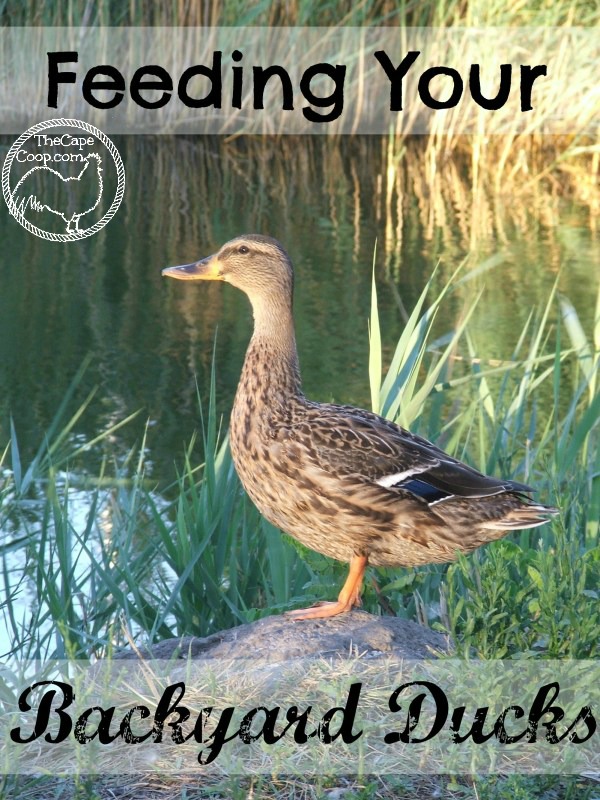
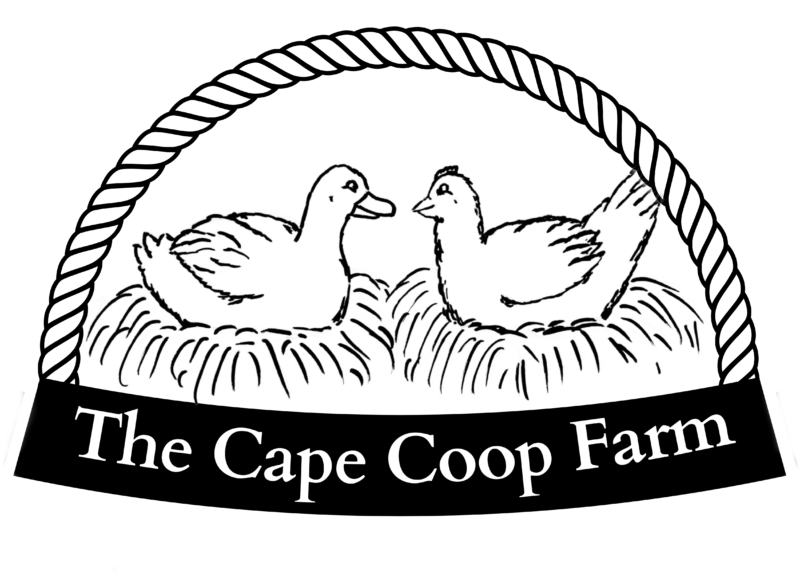
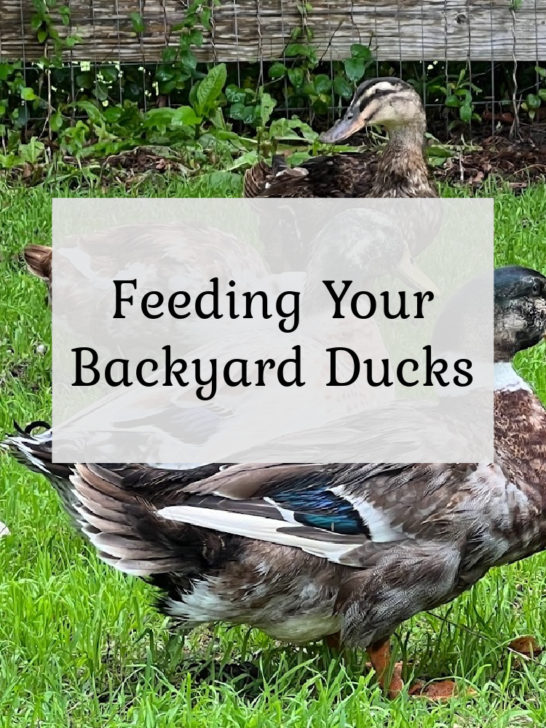

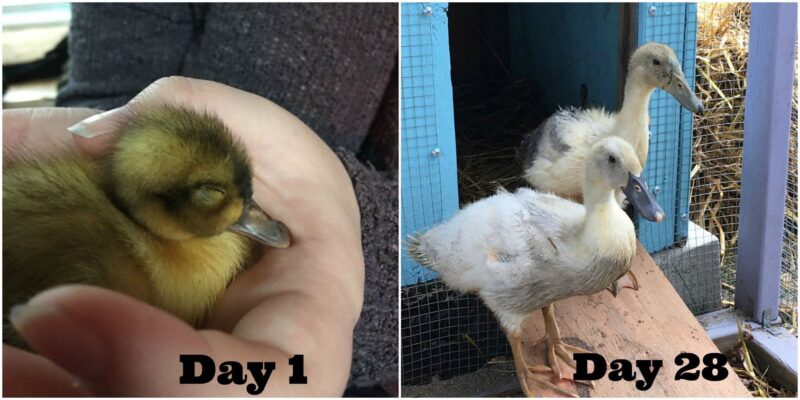
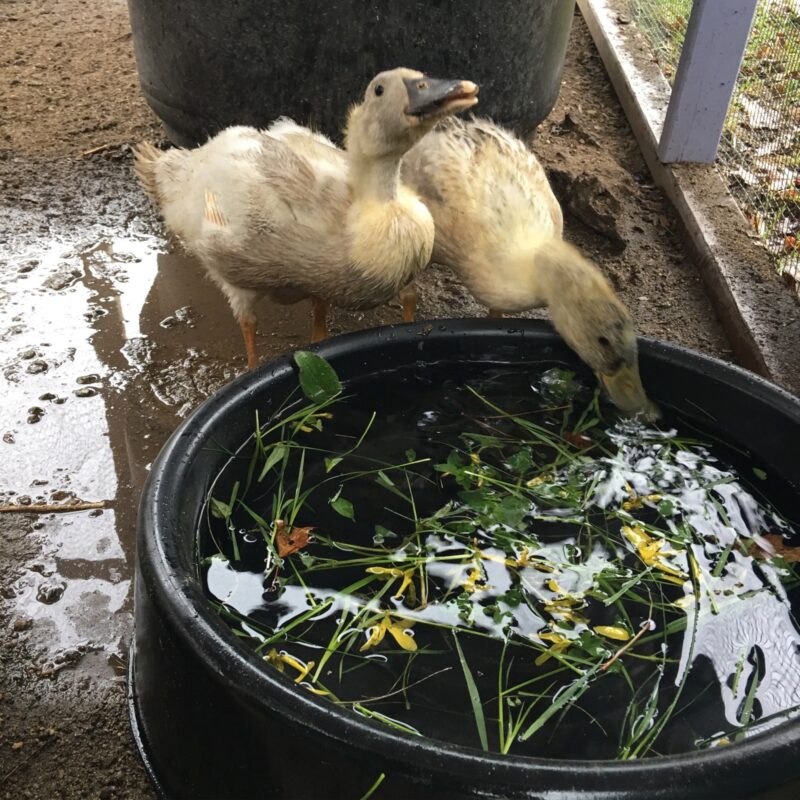
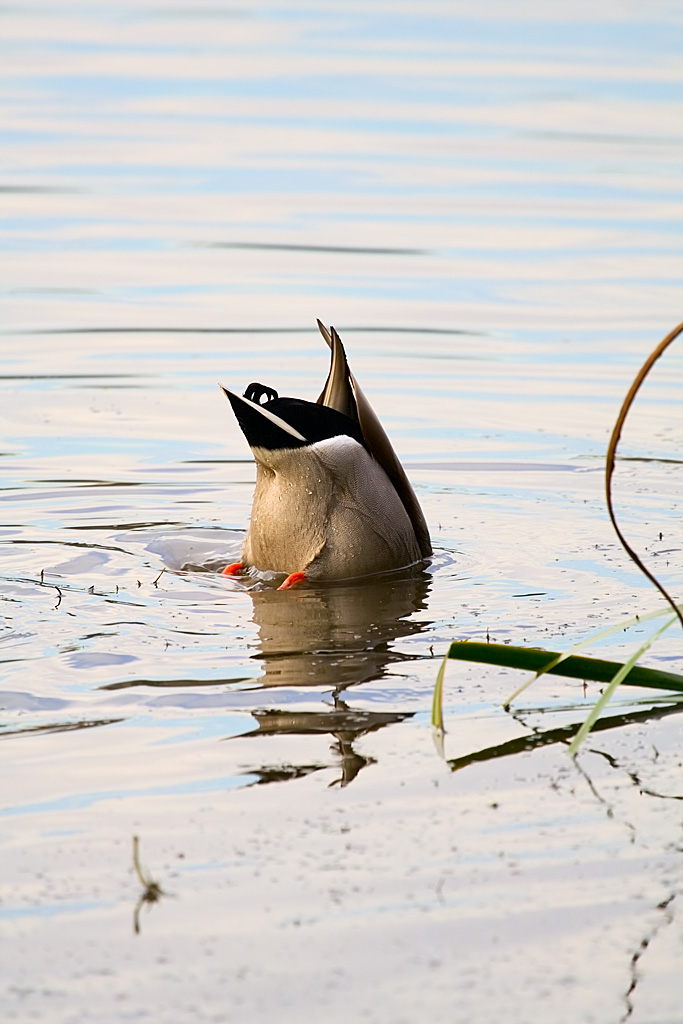
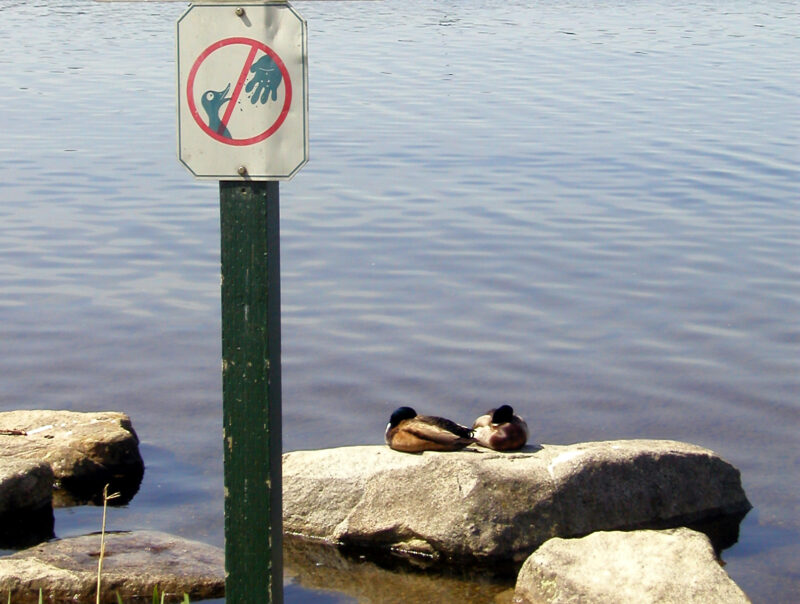

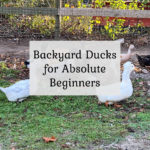
Elle
Wednesday 25th of October 2023
Hi Liz,
Your site is so helpful. After reading quite a few of your posts and talking with my daughter, I am following her lead and just ordered 4 Buff ducklings from Metzgers. I am putting my supplies together, and am wondering how long an 8 lb big of Manna Pro Duck Starter Grower will last with 4 new babies. They will just be 2-3 days old when they arrive. It looks like I could order another bag and get it quickly from Amazon, but just in case they run low I want to have enough on hand to get them through the first foodie stage.
Thank you, Elle
Liz
Sunday 29th of October 2023
Congratulations! I am glad I could be helpful in helping you get ready for your new babies :) How fast they will go through 8 pounds of feed will really depend on how wasteful they are. Most ducklings make a huge mess of their food and end up wasting a lot of it, but some seem to more wasteful than others lol. You'll likely go through an 8 pound bag every week for the 3-4 weeks and then they will hit a growth spurt and start eating even more! So having an extra bag on hand is a very good idea!
Toby
Monday 20th of September 2021
We had 28 ducks come early spring then they dwindled off and stopped around June. We had none for maybe six weeks and then in the last month we started getting two then four females. No males. Last week one day two ladies brought a man. He hasn’t been seen since. Now it’s been about four days since a female duck came. The two that have been coming have been quite friendly and walk over very close to me when I come out with cracked corn. They make a funny quiet sound. I spread about one cup out for them. Back in the summer they used to hang around for a lot of the day, sleeping in the bushes or by the water dish. But now they just come and eat and might rest for an hour and then leave. So it’s become quite random of late. But it’s interesting that we went from having a whole bunch of men and women to having just one or two drop by and no no men at all. I have a video of my two French bulldogs in the front yard with about 10 ducks. The dogs don’t pay much attention to them and the ducks walk towards them within about 5 feet. I wish I knew more about duck behaviour!
Rita
Monday 20th of September 2021
HI my neighbor moved out, however she had been feeding ducks for years, i felt bad so i started feeding them cracked corn. I enjoy them but they are getting very needy and come more than twice a day now, i am spending lots of $$ to feed them. We live about 10 blocks from a lake so they fly back there after eating. i want to feed them but not so many and not so often, but i feel bad. Is there any way that they may stop coming so often and beeing so hungry. We are in Northwest Washington state if that matters.
Liz
Monday 20th of September 2021
Once they know they have an easy source of food they are going to keep coming. I would suggest you start ignoring them when they come too often. It is dangerous for wild ducks to become dependent on humans for food, so encouraging them to forage for their own food is really the best. Providing them with occasional treats is ok but it definitely should not be multiple times per day. Cracked corn can make them fat and slow them down when trying to escape predators so definitely don't want it making up a big portion of their diet!
S. Y.
Tuesday 17th of August 2021
Hey there, I know that you don't have any turkeys but I was wondering if you could give me some advice. We found a wild turkey nest in a feild while moving the cattle one day. We scared the mother away, and thinking that the cattle might smash the eggs we moved the eggs about seven feet away and hoped that the mom would come back. The next morning she had not come back, and the eggs were getting cold. We decided to take them home, but we don't have an incubator so we ended up putting them in a box with hay in it and put a heat lamp over it. We have no idea how old the eggs are, but today two of them are cracked and have what look like beaks sticking out of them. We didn't think they would hatch but now they are so do you have any advice? We have already bought turkey grower feed for them and have a brooder ready (although I'm still not sure they will make it). Any advice on what to do?
Liz
Tuesday 17th of August 2021
Wow! Nice job! I don't know a ton about turkeys but sounds like you have the bases covered. You'll need to keep them in a brooder with a heat lamp for at least a couple weeks. If they are peeping loudly give them more heat, if they are spread out and panting give them less heat. Grower feed, water...you might want to have some Sav-A-Chick to mix in their water on hand (you can find it at feed stores, or Tractor Supply). It will give them a boost after their rough start! Good luck!
Toby
Tuesday 10th of August 2021
We had as many as 28 females and drakes this year since March. The number gradually got down to about 8 to 10 females only. They started leaving and then about three weeks ago we had none. I thought they were completely done until three days ago a female showed up and has come every day the last three days. I toss out a bit of cracked corn for her and she is quite happy to lay in the sun or the bushes for 2-3 hours and leave. Is this the type of thing that ducks do? A whole bunch of them for several weeks or even months and then suddenly just vanish?